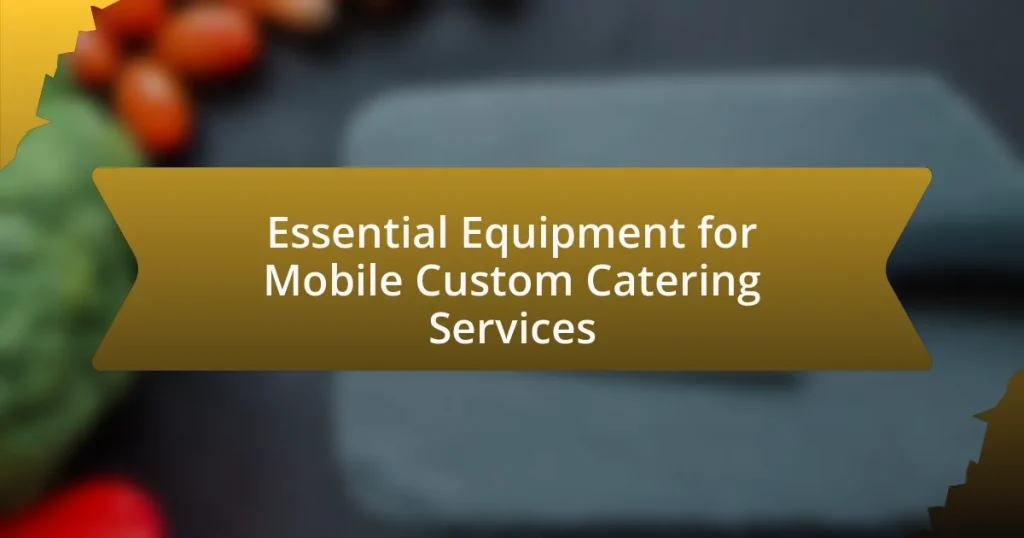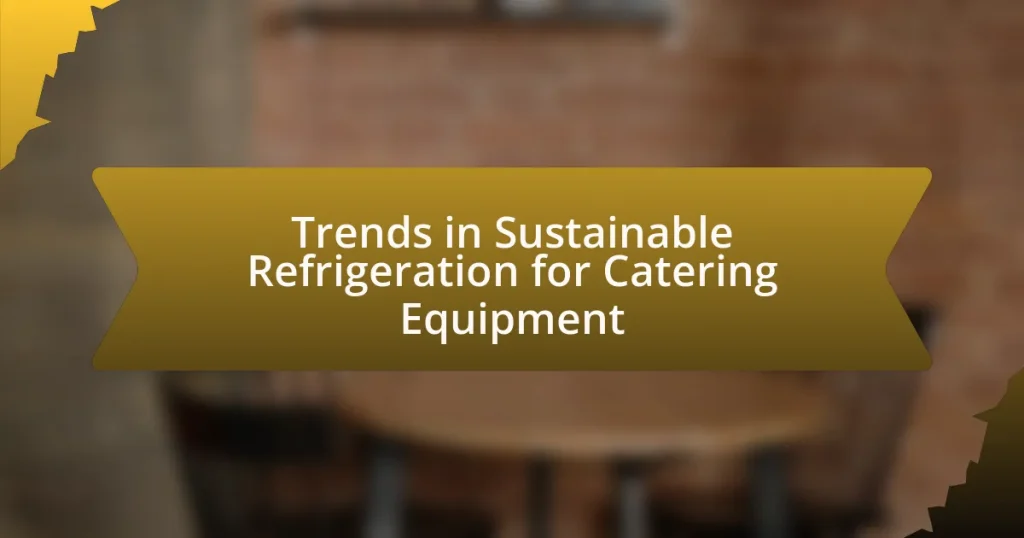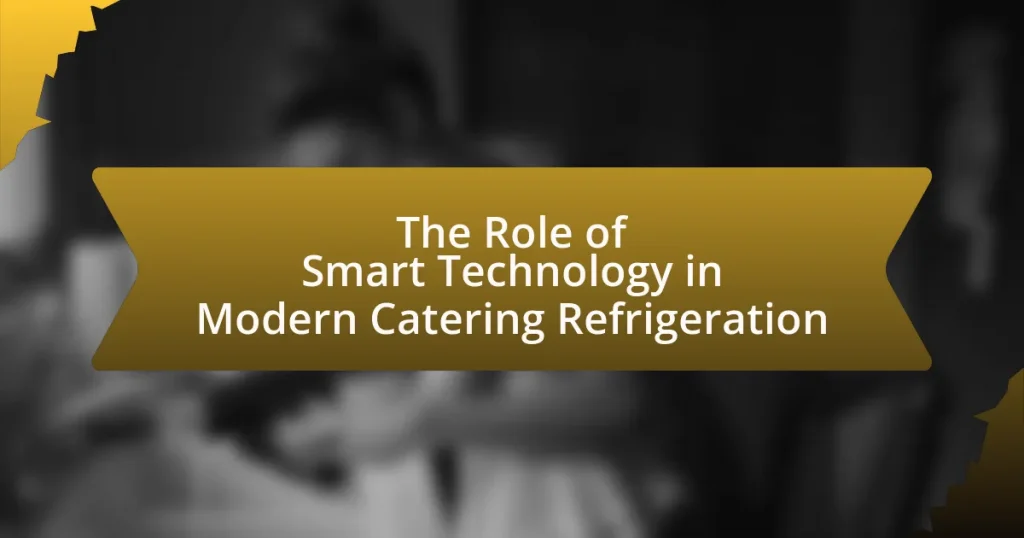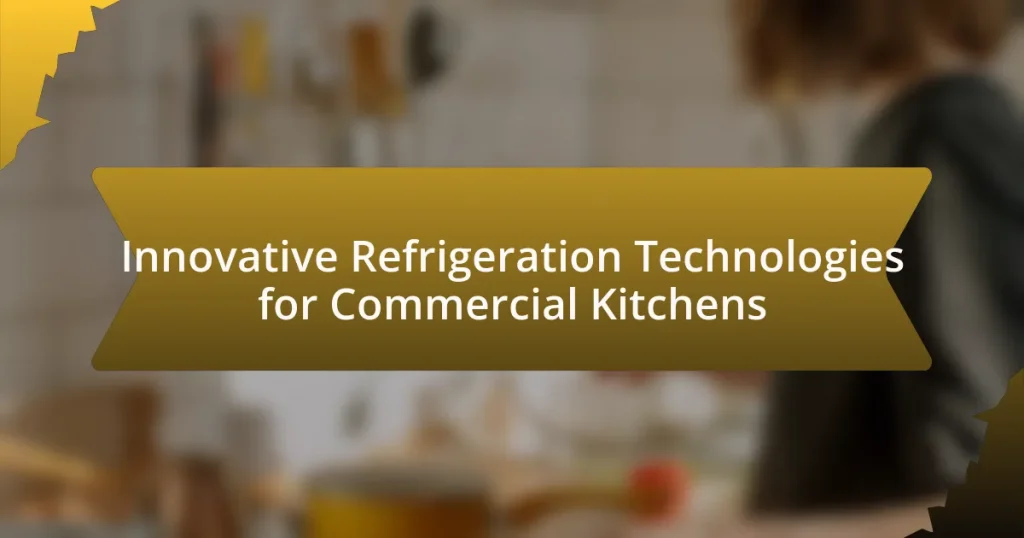The article focuses on essential equipment for mobile custom catering services, highlighting the importance of portable cooking appliances, food storage containers, serving utensils, and transportation vehicles. It distinguishes mobile custom catering from traditional catering by emphasizing flexibility and adaptability to various locations and events. The article also addresses unique challenges faced by mobile caterers, such as logistical coordination and regulatory compliance, while underscoring the necessity of specialized equipment for food safety and efficiency. Additionally, it explores best practices for equipment maintenance, the impact of technology on operations, and strategies for optimizing service delivery in mobile catering environments.
What is Essential Equipment for Mobile Custom Catering Services?
Essential equipment for mobile custom catering services includes portable cooking appliances, food storage containers, serving utensils, and transportation vehicles. Portable cooking appliances such as grills, ovens, and fryers enable caterers to prepare food on-site, ensuring freshness and quality. Food storage containers are crucial for maintaining food safety and organization, while serving utensils facilitate efficient service. Additionally, transportation vehicles are necessary for moving equipment and ingredients to various locations, making them integral to the operation of mobile catering services.
How does mobile custom catering differ from traditional catering?
Mobile custom catering differs from traditional catering primarily in its flexibility and location adaptability. Mobile custom catering operates from food trucks or portable setups, allowing services to be provided at various venues, including outdoor events and remote locations, whereas traditional catering typically requires a fixed kitchen and is often limited to specific venues. This adaptability enables mobile caterers to serve a diverse range of events, from festivals to private parties, without the constraints of a traditional kitchen setup. Additionally, mobile custom catering often emphasizes a personalized menu tailored to the client’s preferences, enhancing the customer experience compared to the more standardized offerings of traditional catering services.
What are the unique challenges faced by mobile custom caterers?
Mobile custom caterers face unique challenges such as logistical coordination, equipment limitations, and regulatory compliance. Logistical coordination involves managing transportation of food and equipment to various locations while ensuring timely service, which can be complicated by traffic and distance. Equipment limitations arise from the need to operate within confined spaces, requiring specialized tools that are both portable and efficient. Regulatory compliance includes adhering to health and safety standards that vary by location, necessitating knowledge of local laws and regulations. These challenges can significantly impact the efficiency and success of mobile catering operations.
Why is specialized equipment necessary for mobile catering?
Specialized equipment is necessary for mobile catering because it ensures food safety, efficiency, and compliance with health regulations. Mobile catering operations often work in diverse environments, requiring equipment that can maintain proper temperatures for cooking and storage, such as portable refrigerators and food warmers. Additionally, specialized cooking appliances, like grills and fryers designed for mobility, allow caterers to prepare food on-site, enhancing freshness and flavor. Compliance with local health codes mandates the use of equipment that meets specific safety standards, which is critical for preventing foodborne illnesses. Thus, the use of specialized equipment is essential for delivering high-quality, safe, and compliant catering services.
What types of equipment are essential for mobile custom catering?
Essential equipment for mobile custom catering includes portable cooking appliances, food storage containers, serving utensils, and transportation vehicles. Portable cooking appliances such as grills, ovens, and fryers enable chefs to prepare meals on-site, ensuring freshness and quality. Food storage containers are crucial for maintaining food safety and organization, allowing for proper temperature control and easy access to ingredients. Serving utensils, including chafing dishes and serving trays, facilitate efficient meal presentation and service. Finally, transportation vehicles, often equipped with refrigeration units, are necessary for transporting food and equipment to various locations while adhering to health regulations.
What cooking equipment should every mobile caterer have?
Every mobile caterer should have a portable cooking station, which typically includes a grill, fryer, and stovetop. This equipment allows for versatile cooking options and can accommodate various menu items. Additionally, mobile caterers should possess food storage containers, ensuring ingredients remain fresh and safe during transport. A reliable generator is also essential, providing the necessary power for cooking equipment in locations without electricity. Furthermore, utensils, cutting boards, and serving dishes are crucial for food preparation and presentation. These items collectively enable mobile caterers to operate efficiently and meet customer demands effectively.
How do serving and storage solutions impact mobile catering efficiency?
Serving and storage solutions significantly enhance mobile catering efficiency by optimizing food preservation and streamlining service processes. Effective storage solutions, such as insulated containers and refrigeration units, maintain food quality and safety, reducing waste and ensuring compliance with health regulations. Additionally, well-designed serving solutions, like portable serving stations and organized utensils, facilitate quicker service, allowing caterers to serve more customers in less time. This efficiency is crucial in high-demand environments, where speed and quality directly impact customer satisfaction and business reputation.
What safety equipment is crucial for mobile catering operations?
Crucial safety equipment for mobile catering operations includes fire extinguishers, first aid kits, and food safety thermometers. Fire extinguishers are essential for quickly addressing any fire hazards that may arise from cooking equipment, as they can prevent small fires from escalating. First aid kits are necessary to provide immediate medical assistance in case of injuries, ensuring the safety of staff and customers. Food safety thermometers are vital for monitoring food temperatures, which helps prevent foodborne illnesses by ensuring that food is cooked and stored at safe temperatures. These pieces of equipment collectively enhance the safety and compliance of mobile catering operations.
How do you choose the right equipment for mobile custom catering?
To choose the right equipment for mobile custom catering, assess the specific menu offerings and service style. The equipment must align with the types of food being prepared and served, such as grills for barbecues or ovens for baked goods. Additionally, consider the size and capacity of the equipment to ensure it meets the demands of the expected number of guests. For instance, a food truck may require compact, multi-functional appliances to maximize space while maintaining efficiency. Furthermore, evaluate the power source availability, whether it be gas, electric, or battery-operated, to ensure the equipment can operate effectively in various locations. This approach ensures that the catering service is well-equipped to deliver high-quality food and service.
What factors should be considered when selecting catering equipment?
When selecting catering equipment, factors such as functionality, capacity, durability, and ease of transport must be considered. Functionality ensures that the equipment meets the specific needs of the catering service, such as cooking, holding, or serving food. Capacity is crucial to accommodate the expected volume of food and guests, preventing bottlenecks during service. Durability is important for long-term investment, as high-quality materials withstand frequent use and transport. Lastly, ease of transport is vital for mobile catering, as equipment must be lightweight and compact for efficient setup and breakdown. These considerations help ensure that the catering operation runs smoothly and effectively.
How does the size of the catering operation influence equipment choice?
The size of the catering operation significantly influences equipment choice by determining the volume and type of food preparation and service required. Larger catering operations necessitate commercial-grade equipment capable of handling higher capacities, such as industrial ovens, large-scale refrigeration units, and extensive cooking tools, to efficiently serve a greater number of clients. In contrast, smaller operations may opt for more compact, versatile equipment that can perform multiple functions, such as portable grills or smaller food processors, to meet their limited service demands. This distinction is supported by industry standards, which indicate that equipment must align with operational scale to ensure efficiency and compliance with health regulations.
What budget considerations are important for mobile caterers?
Mobile caterers must consider several budget factors, including equipment costs, ingredient expenses, labor wages, and operational overhead. Equipment costs can vary significantly based on the type and quality of cooking appliances, serving tools, and transportation vehicles required for efficient service. Ingredient expenses depend on menu choices and sourcing, which can fluctuate based on seasonality and supplier pricing. Labor wages are essential for staffing events, and mobile caterers should account for both full-time and part-time employees, including any necessary training costs. Operational overhead encompasses permits, insurance, fuel, and maintenance for vehicles and equipment, which can impact overall profitability. These considerations are critical for maintaining a sustainable business model in the competitive catering industry.
How can technology enhance mobile catering services?
Technology can enhance mobile catering services by streamlining operations, improving customer engagement, and optimizing food delivery. For instance, mobile apps enable customers to place orders in advance, reducing wait times and increasing satisfaction. Additionally, GPS tracking allows caterers to monitor delivery routes in real-time, ensuring timely service and reducing fuel costs. According to a study by the National Restaurant Association, 70% of consumers prefer to order food through mobile apps, highlighting the importance of technology in meeting customer preferences. Furthermore, point-of-sale systems integrated with inventory management can help caterers track supplies and minimize waste, ultimately improving profitability.
What role do mobile payment systems play in catering efficiency?
Mobile payment systems significantly enhance catering efficiency by streamlining transaction processes. These systems enable quick and secure payments, reducing the time spent on cash handling and manual processing. For instance, a study by the National Restaurant Association found that 70% of consumers prefer mobile payments for their speed and convenience, which directly translates to faster service in catering environments. Additionally, mobile payment systems often integrate with inventory management tools, allowing caterers to track sales in real-time and adjust their offerings accordingly, further optimizing operational efficiency.
How can inventory management software benefit mobile caterers?
Inventory management software can significantly benefit mobile caterers by streamlining their inventory tracking and reducing food waste. This software allows caterers to monitor stock levels in real-time, ensuring they have the necessary ingredients for events without over-purchasing. For instance, a study by the Food Waste Reduction Alliance found that effective inventory management can reduce food waste by up to 30%, which directly impacts profitability. Additionally, the software can automate reordering processes, helping caterers maintain optimal inventory levels and avoid last-minute shortages. By utilizing inventory management software, mobile caterers can enhance operational efficiency and improve overall service quality.
What are the best practices for maintaining catering equipment?
The best practices for maintaining catering equipment include regular cleaning, proper storage, routine inspections, and timely repairs. Regular cleaning prevents the buildup of grease and food particles, which can lead to equipment malfunction and health hazards. Proper storage ensures that equipment is protected from damage and environmental factors, while routine inspections help identify wear and tear before they become significant issues. Timely repairs are crucial to maintaining functionality and extending the lifespan of the equipment. Following these practices can enhance operational efficiency and ensure compliance with health and safety regulations.
How can mobile caterers ensure their equipment remains in top condition?
Mobile caterers can ensure their equipment remains in top condition by implementing regular maintenance schedules and thorough cleaning protocols. Regular maintenance includes checking for wear and tear, ensuring all components function properly, and replacing any damaged parts promptly. Thorough cleaning after each event prevents the buildup of grease and food particles, which can lead to equipment malfunction. Additionally, using high-quality materials and following manufacturer guidelines for usage and storage can significantly extend the lifespan of catering equipment.
What routine maintenance tasks should be performed regularly?
Routine maintenance tasks that should be performed regularly for mobile custom catering services include checking and cleaning equipment, inspecting food storage areas, and ensuring proper sanitation practices. Regularly cleaning cooking appliances, such as grills and ovens, prevents buildup that can affect performance and food safety. Inspecting food storage areas ensures that temperatures are maintained within safe limits, which is crucial for preventing foodborne illnesses. Additionally, adhering to sanitation practices, such as washing hands and surfaces frequently, is essential for maintaining hygiene standards. These tasks are vital for ensuring the safety and efficiency of catering operations.
How can caterers troubleshoot common equipment issues?
Caterers can troubleshoot common equipment issues by systematically identifying the problem, checking power sources, and consulting user manuals. For instance, if a catering oven fails to heat, the caterer should first ensure it is plugged in and that the circuit breaker has not tripped. If the issue persists, reviewing the user manual can provide specific troubleshooting steps related to that model. Additionally, maintaining a log of past equipment issues and resolutions can help in quickly diagnosing recurring problems. This methodical approach is supported by industry best practices, which emphasize the importance of regular equipment maintenance and operator training to minimize downtime and ensure efficient service.
What tips can improve the efficiency of mobile custom catering services?
To improve the efficiency of mobile custom catering services, implementing streamlined logistics and effective communication is essential. Efficient routing and scheduling minimize travel time and ensure timely service delivery, while clear communication with clients regarding menu options and service expectations enhances customer satisfaction. Additionally, investing in high-quality, portable equipment allows for quicker setup and breakdown, further optimizing service efficiency. For instance, using multi-functional cooking appliances can reduce the need for multiple devices, saving space and time.
How can effective planning streamline the catering process?
Effective planning can streamline the catering process by ensuring that all logistical elements are organized and executed efficiently. This includes creating detailed timelines, coordinating staff assignments, and managing inventory, which minimizes delays and reduces the risk of errors. For instance, a study by the National Association of Catering Executives found that companies with structured planning processes experienced a 30% increase in operational efficiency. By anticipating needs and potential challenges, effective planning allows caterers to allocate resources wisely, leading to smoother service delivery and enhanced customer satisfaction.
What strategies can be employed to optimize equipment usage on-site?
To optimize equipment usage on-site, implementing a systematic inventory management system is essential. This strategy ensures that all equipment is tracked, maintained, and utilized efficiently, reducing downtime and preventing overuse or underuse. For instance, using software tools that monitor equipment status and location can enhance visibility and facilitate timely maintenance, which is crucial in mobile custom catering services where equipment reliability directly impacts service quality. Additionally, training staff on proper equipment handling and scheduling usage based on demand can further maximize efficiency, as evidenced by studies showing that well-trained teams can reduce equipment-related issues by up to 30%.



